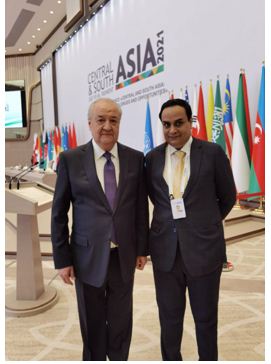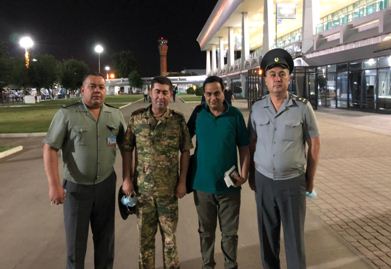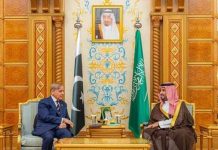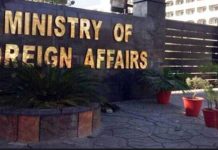Dr Mehmood Ul Hassan Khan
After the successful international conference titled “Central and South Asia: Regional Connectivity, Challenges and Opportunities” the Republic of Uzbekistan has now started its “third renaissance”. Moreover, Uzbekistan’s regional “connect policy” is also inching towards greater socio-economic dividends.

the Republic of Uzbekistan under the visionary leadership of H.E. Shavkat Mirziyoyev has already started its journey of immense socio-economic prosperity, economic sustainability, political stability, regional connectivity, reconciliation, innovation, qualitative education, human capital and last but not least, “commercial diplomacy” towards its third renaissance. Uzbekistan’s third renaissance “comprises” of greater regional connectivity, commercial diplomacy, trans-regional mega projects, continuation of structural reforms, diversification of macro-economy, “pragmatic & friendly foreign policy module” and last but not least, “holistic model of connectivity based on “shared prosperity. Its third renaissance has now been getting “momentum” and new “heights” since the start of the presidency of Shavkat Mirziyoyev 2017.

Its Ist & 2nd renaissance was the total “sum” of superior human knowledge, wisdom, science & arts, spirits of survival, prosperity, infrastructural development, strategic expansion, statesmanship, good governance, logistic connectivity, trade & commerce, sharing & caring and last but not least, friendship, peace and harmony and this international conference would gear-up Uzbekistan’s third renaissance.
During Pak-Uzbek Business Forum, the Prime Minister of Uzbekistan Abdulla Aripov mentioned the strong ties between Pakistan and Uzbekistan in multiple areas of cooperation. He welcomed PM Imran Khan on his official visit to Uzbekistan, which he said would usher in a new area of cooperation and joint ventures between the two brotherly countries.
While speaking to media Foreign Minister Shah Mehmood Qureshi said Pakistan and Uzbekistan had vast potential to explore the opportunities of bilateral trade and investment for their mutual interest.
He shared that the Pak-Uzbek Business Forum was attended by around 130 representatives of leading companies and business houses from Pakistan. During this forum various agreements worth of $500 million were signed which hopefully would further strengthening the pace and scope of bilateral trade.
Information Minister Chaudhry Fawad Hussain said two important objectives of the prime minister’s visit were to ensure travel facilities among Pakistan, Uzbekistan and Afghanistan and to deliberate upon ways to ensure peace in Afghanistan. He said Pakistan desired an effective trade linkage up to Uzbekistan and other Central Asian states.
He emphasized that an effective transportation infrastructure should be developed as soon as possible for loading goods loaded from Pakistan’s Karachi and Gwadar seaports to reach Uzbekistan’s Tashkent.
During the Pak-Uzbek Business Forum, both sides vowed to expand multifaceted bilateral cooperation to all areas of mutual interest and stressed the need for resolution of the Afghanistan conflict through internal political process imperative for peace and progress of the whole region.
Prime Minister Imran Khan while addressing the business forum, expressed the hope that Pakistan’s connectivity (through rail, road and aviation) with Uzbekistan in trade and bilateral spheres would open up new avenues of prosperity in the region.
He assured the businessmen and traders of Uzbekistan that Pakistan would extend them every possible facility in promotion of trade. He said the railway project between Pakistan, Uzbekistan and Afghanistan would prove to be a revolution of development, adding that peace and security in the neighbourhood was essential to exploit the region’s potential.
A joint declaration was issued at the conclusion of the business forum. Prime Minister Khan and Uzbek President Mirziyoyev agreed to strengthen their multifaceted ties in political, trade and economic, energy, communication, science and technology, education and cultural spheres, and fighting Covid-19. Both leaders announced the establishment of a strategic partnership for mutual benefit of the two countries.
They agreed on the regular exchange of parliamentary delegations to deepen bilateral ties. The Uzbek side confirmed the invitation to Senate Chairman Sadiq Sanjrani to pay a visit to Uzbekistan.
Both leaders expressed readiness to maintain a regular dialogue and build constructive cooperation in the field of security and defence and to expand cooperation between law enforcement agencies of the two countries, particularly in the fight against terrorism and drug trafficking.
The two leaders welcomed the signing of the agreement on transit trade as an important tool for expanding bilateral trade. They reiterated their support for the Termez-Mazar-i-Sharif-Kabul-Peshawar railway project as an important initiative to create a rail link from Central Asia to the Arabian Sea through Afghanistan and Pakistani seaports of Karachi, Gwadar and Bin Qasim.
The two leaders also recognised immense potential of the China-Pakistan Economic Corridor for the benefit of the entire Central Asian region and beyond entailing greater connectivity and trade linkages through a network of transport, fibre optic cable, energy pipelines, and investment opportunities in its SEZs.
The two leaders welcomed resumption of direct regular flights between Pakistan and Uzbekistan.
Pakistan and Uzbekistan agreed to finalise bilateral Preferential Trade Agreement (PTA) within three months to further boost bilateral trade volume.
At the 6th meeting of the Uzbek-Pakistani Intergovernmental Commission on Trade-Economic and Scientific-Technical Cooperation (IGC) held in Tashkent, both sides agreed to form joint working groups on agriculture, information technology, education and mineral sectors to boost cooperation, said a news release issued here.
They both agreed that trans-Afghan corridor which connected Uzbekistan and Pakistan would play an important role in enhancing bilateral trade between the two countries.
The parties agreed to deepen partnership in the field of industrial cooperation, including by organising joint ventures in the field of textile industry, assembly of agricultural machinery, processing and packaging of fruit and vegetable products.
It was settled to deepen cooperation in energy and mineral sector, agriculture, transportation and communication, labor, education, tourism, science and technology, technology parks, housing and communal services, intercity collaborations, standards, meteorology, culture and youth affairs.
They recognised the importance of closer collaboration for post-Covid recovery to sustainably recover through technology, innovation and economic partnership, aiming at increased economic diversification, sustainable growth, building supply chain resilience, and robust regulatory environments. It was also agreed to develop banking links to create favourable conditions for the further development of bilateral trade.
Meanwhile, two countries agreed to organise Uzbek-Pakistani specialised exhibitions (Made in Uzbekistan/Made in Pakistan) in Tashkent and Islamabad to promote a wide range of export goods and to facilitate attraction of leading companies in pharmaceuticals, textile, and leather, production of construction materials and agriculture industries and transport and logistics services of both countries.
Chinese State Councilor and Foreign Minister Wang Yi also attended this conference and termed connectivity as an unremitting pursuit of human society since ancient times. He labeled it as a key impetus to development and prosperity in today’s world.
He showcased President Xi Jinping’s the Belt and Road Initiative (BRI) as instrumental tool in bilateral relations and cooperation between China and Central and South Asian countries.
According to Uzbekistan official figures (June 2021) the average annual investment growth rate was 22 percent during the last four years. The total volume of foreign investment surpassed $26.6 billion, including direct investments of $17.5 billion.
Moreover, the total volume of investments over the past 4 years has increased by more than 2.1 times, including foreign investments by 2.7 times. The share of investment of GDP in 2019 exceeded 38 percent for the first time, which created a solid foundation for ensuring economic growth in the coming years.
The GDP of Uzbekistan in 2019 increased by 5.6 percent. Despite the complex and complicated economic conditions and ongoing COVID-19 pandemic the World Bank has predicted the country’s GDP growth in 2021 by 4.8 percent, which is one of the best indicators among developing countries.
Furthermore, Uzbekistan’s foreign trade turnover is growing much faster than GDP and in 2019 increased by 26.2 percent, amounting to $42.2 billion. While in just 9 months of 2020, despite the pandemic, the country’s foreign trade reached $27.5 billion.
Being prominent regional expert of Uzbekistan & CIS I submit that all the regional should promote “openness” and “inclusiveness” and uphold the spirit of partnership. All countries should start their journeys from “structural” reforms to structured “engagements”.
All sides should support concept of greater connectivity which helps them to go forward together. Geopolitical games should be discouraged and spirits of disintegration should also be discarded. The principles of extensive consultation, joint contribution, and shared benefits should be institutionalized to create a bright future of integrated development with all countries.
Central Asia and South Asia should pursue both hardware and software development in promoting infrastructure connectivity. In this case, Pakistan is ready to work with all regional countries to align their infrastructure development strategies, push forward “hard connectivity” and “soft connectivity” in parallel, and strive to build an all-dimensional, multi-faceted and sustainable connectivity network with the extended CPEC contributions through seaports of Gwadar.
Pakistan supports the building of a corridor connecting Central and South Asia, helping countries in the region transform from “land-locked” to “land-connected” nations, and jointly building a major international transport route connecting Europe with Asia and linking the north with the south in which BRI and CPEC would play very important role.
Regional countries should adhere to the principle of mutual benefit and win-win cooperation, and increase financing services because zero-sum game has no substance. Pakistan calls on the World Bank, the Asian Infrastructure Investment Bank, the Asian Development Bank, and the Silk Road Fund to invest in connectivity projects, broaden diverse financing channels, and widely attract investment from private and social sectors, so that these projects will receive stable, transparent and high-quality financial support.
Regional countries should stick to the principle of common security and overcome obstacles in the cooperation. Main stakeholders should honor their commitments, fulfill their obligations, and strive to prevent the deterioration of the security situation in Afghanistan.
The conference was hosted by Uzbekistan. Leaders of countries including Afghanistan and Pakistan, foreign ministers of countries including China, Russia, Kazakhstan, Tajikistan, Turkmenistan, India, Bangladesh, the Maldives, Saudi Arabia, Kuwait and Turkey, the United Nations Secretary-General, and the European Union High Representative for Foreign Affairs and Security Policy attended the conference in person or via video link.
Uzbekistan’s President H.E. Shavkat Mirziyoyev has rightly upheld that Uzbekistan is on the “threshold” of a new era the “Third Renaissance” and international conference titled “Central and South Asia: Regional Connectivity, Challenges and Opportunities has now opened new window of opportunity for achieving dreams of greater regional connectivity, immense socio-economic integration and energy & food cooperation.

















